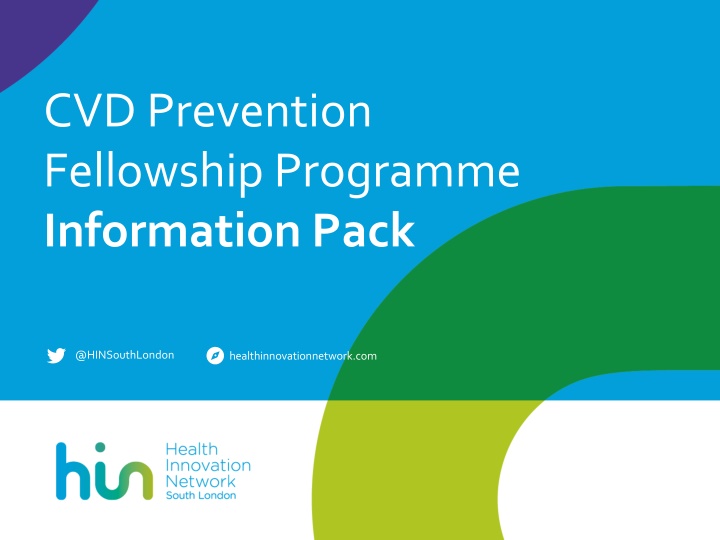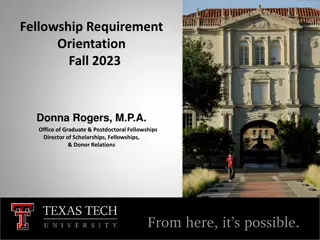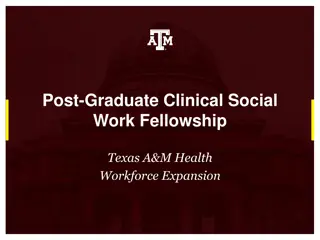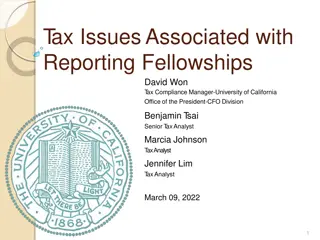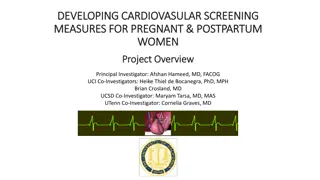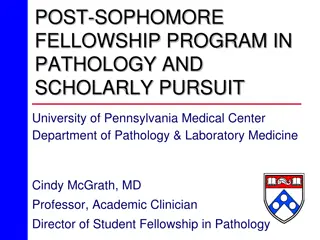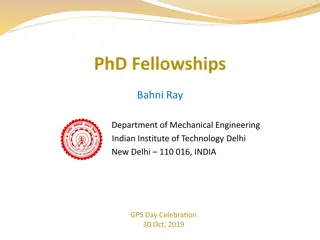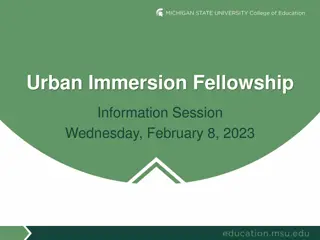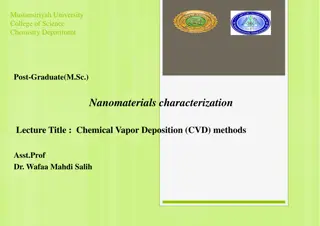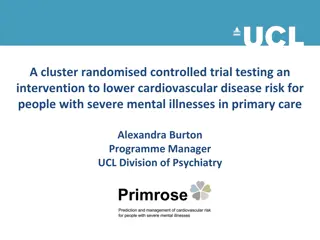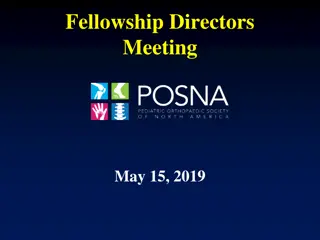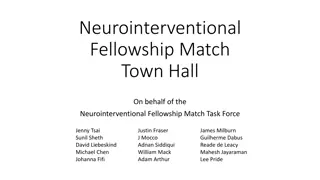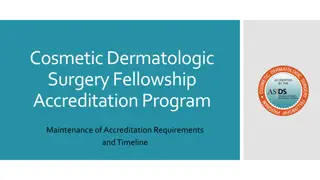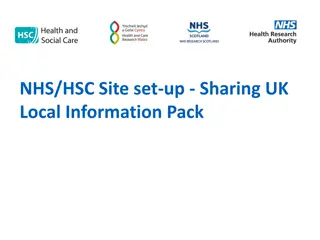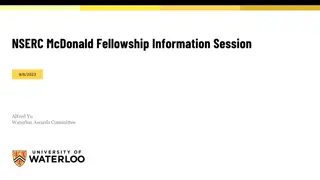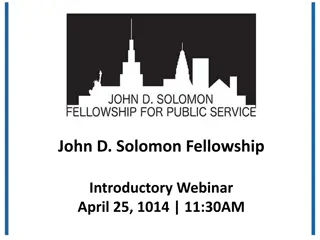Cardiovascular Disease Prevention Fellowship Programme Information Pack
The Cardiovascular Disease Prevention Fellowship Programme by Health Innovation Network offers a comprehensive 7-month program for healthcare professionals to enhance their skills in cardiovascular disease prevention. The program includes clinical webinars, improvement collaborative sessions, and quality improvement projects aligned with primary care priorities. Participants will engage with expert speakers and address key topics such as lipid management, hypertension, atrial fibrillation, and more. Attendance at all sessions is mandatory for a fruitful learning experience.
Download Presentation

Please find below an Image/Link to download the presentation.
The content on the website is provided AS IS for your information and personal use only. It may not be sold, licensed, or shared on other websites without obtaining consent from the author.If you encounter any issues during the download, it is possible that the publisher has removed the file from their server.
You are allowed to download the files provided on this website for personal or commercial use, subject to the condition that they are used lawfully. All files are the property of their respective owners.
The content on the website is provided AS IS for your information and personal use only. It may not be sold, licensed, or shared on other websites without obtaining consent from the author.
E N D
Presentation Transcript
CVD Prevention Fellowship Programme Information Pack @HINSouthLondon healthinnovationnetwork.com
Contents 1. About the programme and expectations 2. Schedule 3. Clinical Webinar Speakers Bio 4. Teams and Key Contact 5. Improvement Collaborative 6. Fellows Learning 2
About the Programme and Expectations of Fellows Welcome to the Health Innovation Network s Cardiovascular Disease Prevention programme cohort 1. We are so pleased that you are interested in learning more about the clinical aspect of cardiovascular disease prevention and gaining skills to improve the quality of care delivered from your practice and/or PCN. This programme will run for 7 months and consists of 7 clinical webinars alongside 7 improvement collaborative sessions. There will be other drop in sessions set up along the course of the programme however in signing up to this programme you are required to attend all of the clinical webinars and improvement collaboratives. If you are unable to attend any session we ask that you contact the team ideally before but if not after to request information to catch up on the content you have missed. However, being present will be much more beneficial for your learning as well as the other Fellows. 3 As well as attending these sessions you will be developing and running your own quality improvement project. This work will align with existing priorities within primary care, for example through the PCN DES/IIF. Your chosen QI project will help with addressing CVD priorities identified within your practice/PCN.
Programme Schedule Date & Time Topic Speaker(s) 5th April 12-1pm Kick Off session Sophie Mizen, Dr Roy Jogiya and Oliver Brady 7th April 12-1pm General Lipid Management Professor Anthony Wierzbicki and Helen Williams 19th April 12-1pm Improvement Collaborative HIN Team Familial Hypercholesterolemia / UCLP Frameworks Professor Anthony Wierzbicki and Rachel Howatson / Dr Matt Kearney 4th May 12-1.20pm 17th May 12-1pm Improvement Collaborative HIN Team 4 8th June 12-1pm Hypertension Dr Tarek Antonios 21st June 12-1pm Improvement Collaborative HIN Team 5th July 12-1pm Atrial Fibrillation Dr Roy Jogiya 19th July 12-1pm Improvement Collaborative HIN Team 2nd August 12-1pm National Priorities Helen Williams 16th August 12-1pm Improvement Collaborative HIN Team 6th September 12-1pm Statin Intolerance Pathways Professor Anthony Wierzbicki 20th September 12-1pm Improvement Collaborative HIN Team 4th October 12- 1pm Secondary Prevention Dr Rupert Williams 19th October 12-1pm Improvement Collaborative HIN Team
Clinical Webinar Speakers Dr Roy Jogiya Professor Anthony Wierzbicki Helen Williams Rachel Howatson Dr Tarek Antonios Dr Rupert Williams 5
Dr Roy Jogiya Clinical Director of CVD Prevention at Health Innovation Network. Consultant Cardiologist at Kingston Hospital Dr Jogiya is trained in all aspects of general Cardiology with specialist interest in heart rhythm disorders and imaging. He is also appointed at St Thomas Hospital where he undertakes more complex procedures. Dr Jogiya grew up locally and studied at Tiffin School for Boys in Kingston. He went to Imperial College and graduated with Honours in Cardiovascular Science (BSc) and Medicine (MBBS). His specialist training was at a number of prestigious cardiac centres including the Royal Brompton, Imperial NHS Trust and St Georges Hospital, during which he gained a PgDip in Medical Law and Ethics. He undertook his PhD in Cardiac MRI at Kings College London and published a number of papers and presented at a number of prestigious international meetings. 6
Professor Anthony Wierzbicki Consultant in metabolic medicine/chemical pathology at Guy s & St. Thomas Hospitals. Honorary Professor in Cardiometabolic Disease at King s College London. He runs a regional centre for lipid-related disorders and provides obesity medicine services and helped set up the regional bariatric service. He is clinical lead for Blood Sciences at Viapath at Guy s & St Thomas Hospitals. His research interests are in the relationship of lipids to atherosclerosis and the role of lipids in peroxisomal diseases. He has been awarded Fellowships of the American Heart Association and of the National Academy of Clinical Biochemistry (USA) for his contributions to atherosclerosis and lipid biology which include 390 publications, 19 book chapters and 1 book. He was a trustee of HEART-UK (the Cholesterol charity) and was chairman of this charity s medical and scientific committee (2002-08). At the National Institute for Health and Clinical Excellence (NICE) he has served on the Technology Appraisal (2006-9), Highly Specialised Therapies (2013-5) and Diagnostics Appraisal committees (2014-20). He was a member of the Familial Hypercholesterolaemia guideline development group (CG71; 2008-2009) and chair of the Lipid Modification Guideline Development Group (CG181; 2012-4). He was chair of the guideline development groups for Chronic Heart Failure (2016-18); Hypertension (2017-19) and Chronic Kidney Disease (2018-21). He was a writing group member for the International guidelines on Familial Hypercholesterolaemia (2013-14) and the American Heart Association scientific consensus statement on Familial Hypercholesterolemia (2015). 7
Helen Williams NationalSpecialty Adviser for CVD Prevention, NHSE and I Consultant Pharmacist for CVD,SouthEastLondon CCG ClinicalAdviserfor CVD,UCLPartners Helen is the National Speciality Adviser for CVD Prevention at NHSE&I and is working on delivery of the CVD ambitions for AF, Blood Pressure and Cholesterol in line with the Long-Term Plan. Helen has worked as a CVD specialist for more than 25 years in hospital, community, and primary care settings. She has led on the development and implementation of consensus evidence-based CVD guidance for use across South London covering a population of 3.6million and supported local practitioners through education and training, guideline implementation, clinical audit, service development and provision of virtual or face to face clinics. 8 Helen was clinical adviser to the national AF AHSN programme and developed the pharmacist-led virtual clinic model to optimise uptake of anticoagulation in AF, which is now being spread nationally through the NHSE AF demonstrator programme.She is currently working at UCLP on the development and implementation of long-term conditions packages designed to support primary care in the post COVID-19 environment.
Dr Tarek Antonios Senior Clinical Lecturer and Consultant Physician in Cardiovascular and General Medicine at St George s, University of London. Dr Antonios is a Clinical Hypertension Specialist, the Director and Clinical lead of the Blood Pressure Unit at St George s University Hospital NHS Trust, which is recognized by the European Society of Hypertension as a Hypertension Center of Excellence. 9 Dr Antonios main research areas include the role of microcirculatory abnormalities in the pathogenesis of essential hypertension, preeclampsia, angina pectoris and heart failure. He is also interested into the microcirculatory mechanisms by which low birth weight and prematurity increase risk of later life cardiovascular disease. The British Heart Foundation has funded his research since 1997.
Dr Rupert Williams Consultant Interventional Cardiologist, Kingston Hospital. Dr Rupert Williams studied medicine at St George s University of London, graduating with a clinical distinction in 2006. Academic Clinical Fellow in Cardiovascular Diseases at St Thomas Hospital, leading to completion of a PhD in Cardiovascular Physiology in 2016 under Professors Marber and Redwood. This clinical PhD in coronary artery disease patients investigated the physiological adaptations that the heart undergoes during physical exertion: in particular the adverse adaptations that occur during cold air inhalation, and conversely the beneficial adaptations that occur after a period of warm up exercise. His work won the Young Investigator Award at the British Cardiovascular Intervention Society in 2016, and his PhD was nominated for the Elsevier outstanding thesis award. 10 Dr Williams s specialist interest is in coronary angioplasty, including complex PCI and chronic total occlusion PCI, but he has a broad experience of general cardiology and aims to offer holistic care to his patients. He is involved in undergraduate and post-graduate teaching and is co-curricular lead at the Royal Society of Medicine for registrars training in Intervention in London.
Quality Improvement For this programme you are being asked to design and run your own quality improvement project. The next 2 slides provide some more information about this aspect of the programme. 11
Teams: For this programme there are 7 teams where you all have a nominated team leader from the Health Innovation Network who will be your key contact throughout the programme. South East London South West London Team 1: Bexley Team 5: Croydon, Merton and Sutton Key contact: Kate Rawlings Kate.rawlings1@nhs.net Key contact: Kristina Leonnet kristina.leonnet@nhs.net 12 Team 2: Bromley and Greenwich Team 6: Wandsworth Key contact: Pearl Brathwaite Key contact: Ambra Caruso pearl.brathwaite@nhs.net ambra.caruso@nhs.net Team 3: Lewisham and Southwark Team 7: Kingston and Richmond Key contact: Rod Watson Key contact: Margaret Connolly rodwatson@nhs.net margaret.connolly2@nhs.net Team 4: Lambeth Key contact: Sophie Mizen sophie.mizen@nhs.net
Improvement Collaborative The improvement collaborative sessions will be where you gain the skills to run your own QI projects, develop projects and run them. This community will also provide the space to get input from your peers on problems that may occur throughout the project life cycle. These projects will be occasionally run in groups within your teams. You have been grouped with anyone who is in your PCN. If you strongly desire to do a project around CVD prevention that differs from what your group wants to do please email your key contact. You will most likely know this after the first improvement collaborative on the 19th of April. 13 It is important you keep colleagues at your primary care practice and PCN in the loop with the work you are doing as you will need their support to implement the quality improvement changes you are trying to make. They will be part of your wider project group. If you have any questions about this aspect of the programme please email your key contact.
Fellows Learning As part of this programme we want to ensure that you are able to track your learning and development. We also would like to assess how effectively the programme is supporting you in doing this. To do this we will be asking you to do the following: Complete a brief reflective note after each webinar and improvement collaborative (a template will be provided). This will be helpful for you to use in appraisals. A quick poll/survey to help us evaluate the contents and structure of fellowship programme after each webinar and improvement collaborative. 14 CVD Prevention Fellowship Reflecion for Personal Development The purpose of this form is to monitor your learning throughout the Fellowship programme. Please complete this form after each clinical webinar and improvement collaborative session. If you wish to share this form with us please send to your Team Co-ordinator. Your Name: Session Title: 1.What insights did you gain from this session that you did not have previously? 2.What area(s) did this session provoke you to do further research on? 3. What new ideas did this session generate (if any) on improving the quality of care within your practice/PCN? Reflective note template Date: (right click over picture, click document object and then open to open document):
